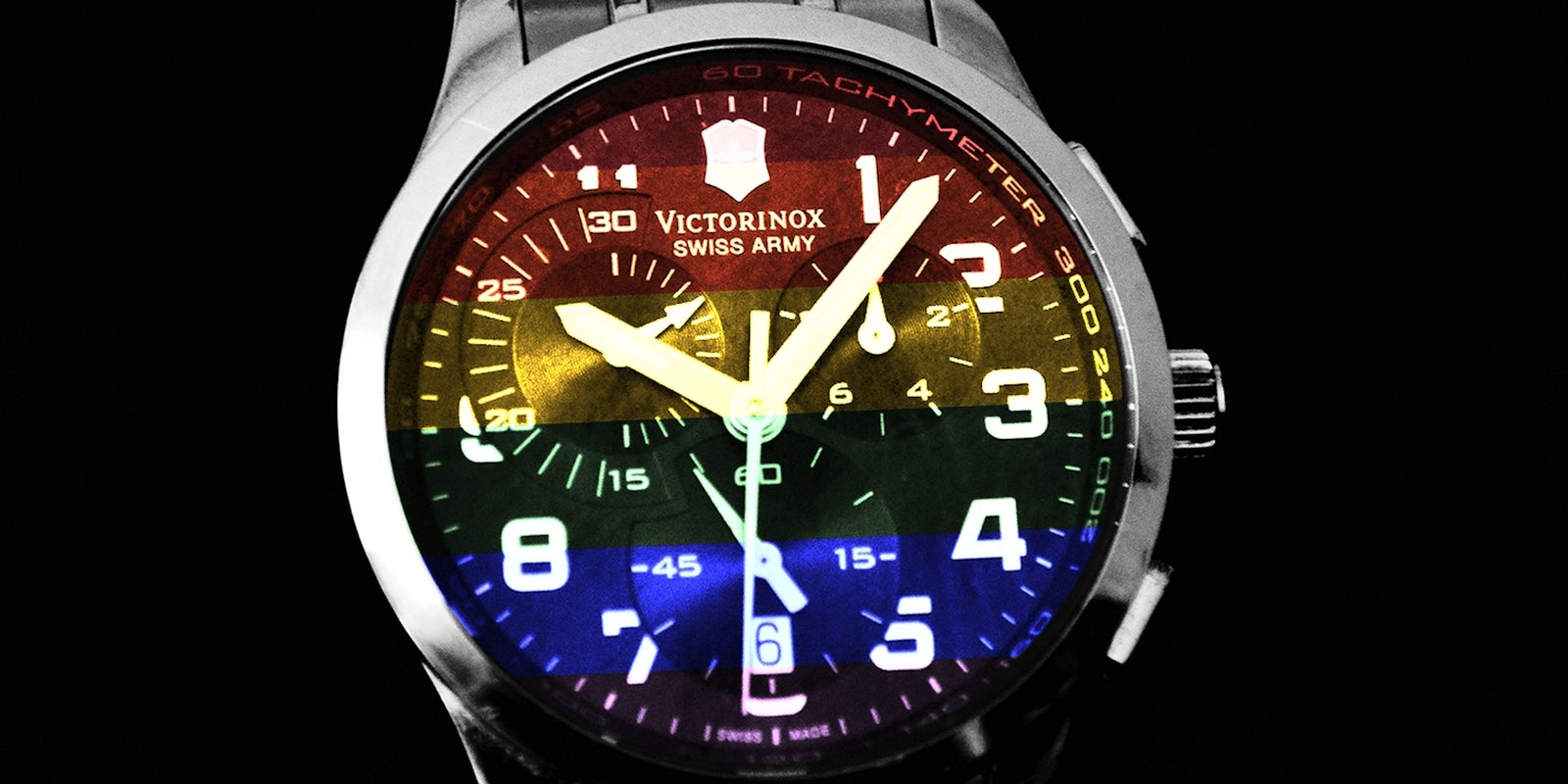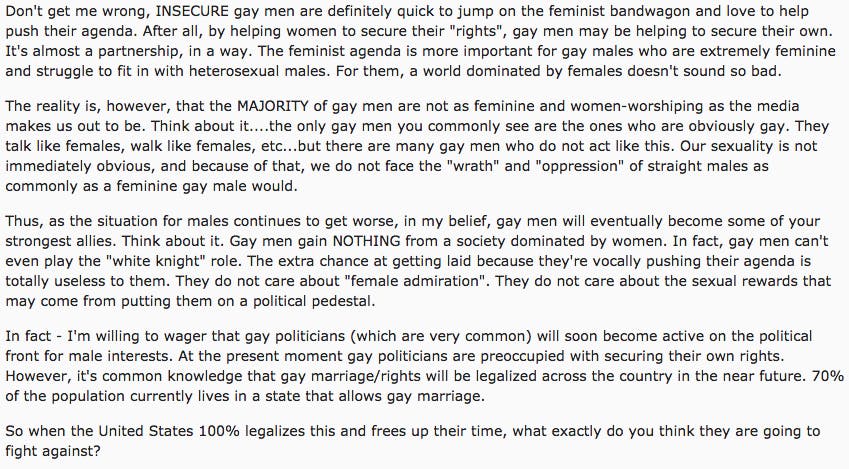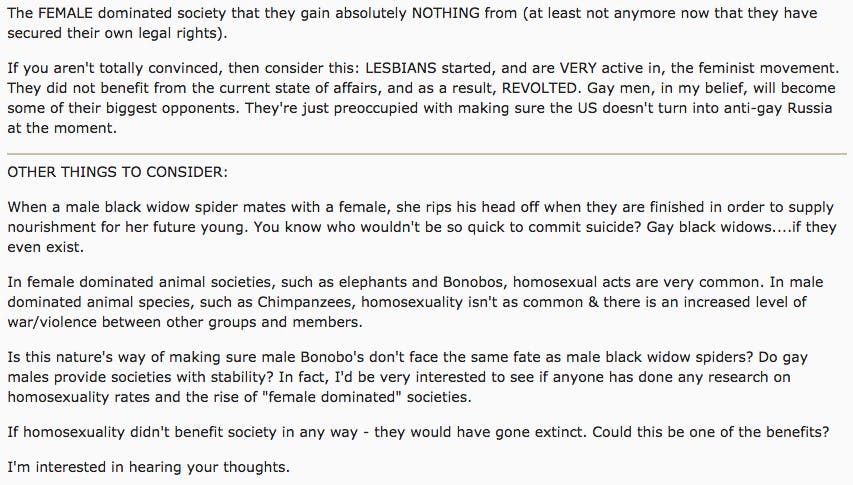In the past few years, more celebrities have proudly and publicly taken on the feminist label: Beyoncé, Taylor Swift, Emma Watson, Amandla Stenberg, and Rowan Blanchard, just to name a few. There are even straight men, like John Legend and Ryan Gosling, who prove you don’t need to be a woman to be a feminist. So why are some gay guys so late to join the movement?
There have long been complaints from some women about the lack of solidarity they feel from gay men. In a blog for the Huffington Post last November, Rose McGowan wrote, “Gay men certainly aren’t more misogynistic than heteros, but I’ve met some that have come damn close.” And in February, the often-controversial Azealia Banks responded to a Vice article that called her homophobic in an Instagram post after using gay slurs. Banks wrote, “Do gay men get a special pass to say misogynist things simply because they like dick?”
https://www.youtube.com/watch?v=I7Re5-wmtyg
It’s taken as a given that straight men have the ability to be misogynistic or sexist. But even though gay men are a group that has been historically oppressed based on their sexuality, that experience doesn’t do away with male privilege. As Patrick Studrick of the Guardian wrote in November 2014, “There is a misogyny among gay men—but our sexist world is the problem.” Strudrick claims that “misogyny is as unavoidable as carbon dioxide,” and that gay men must do more to challenge it.
In January 2014, Aerogram Executive Editor Rohin Guha wrote an article for Jezebel detailing the “dirty secrets of gay male subculture”—misogyny being one of them. “So many of us are only familiar with the idea of male privilege being the province of straight men that we discount how gay men are able to exert dominance and control over women,” Guha wrote.
But even though gay men are a group that has been historically oppressed based on their sexuality, that experience doesn’t do away with male privilege.
Gay male misogyny takes many forms. In a March post on the blog gender-agenda, Cambridge student Martha Perotto-Wills points to the idea that gay men often feel entitled to offer unsolicited criticism of women’s clothing or bodies, in what she calls “Perez Hilton-style gendered shaming of women’s bodies and fashion/life choices.” And even in industries like fashion, which are dominated by gay men and women, sexism persists.
Gay male privilege is also reflected when gay men feel they have license to grope women’s bodies and then insist that it is not harassment because of a lack of sexual attraction. It’s when gay men call women’s vaginas gross or ignore the existence of gay women. And in January, the Advocate‘s Eliel Cruz called out RuPaul’s frequent use of a trans slur and Andy Cohen’s invasive questioning of Nicki Minaj’s sex life as examples of how gay men use their sexuality as an excuse to be misogynistic.
This conversation has also played out on social media. A thread from Reddit’s Red Pill subreddit, a forum that describes itself as “discussions of sexual strategy in a culture increasingly lacking a positive identity for men,” frames gay men as natural “allies” against feminism. The original poster, who claims to be a gay man, writes, “As the situation for males continues to get worse, in my belief, gay men will eventually become some of your strongest allies. Think about it. Gay men gain NOTHING from a society dominated by women. … They do not care about ‘female admiration.’” And, unsurprisingly, straight men replied to thread backing him up.
The root of gay male misogyny goes beyond resistance to the frustrating “gay best friend” trope or countless other stereotypes that gay men are tired of hearing. The Advocate‘s Michael Musto addresses legitimate criticisms of certain feminist groups from the gay community. Musto points to the Redstockings, a radical feminist group founded the same year as the Stonewall Riots, which declared male homosexuality objectionable for its rejection of women.
Still, Musto concedes that gay male sexism is a problem and that some gay men have trouble taking criticism. “There was definitely LGBT outcry over McGowan’s remarks, but it might have been more useful to step back and seriously evaluate them,” Musto wrote.
Gay male privilege is also reflected when gay men feel they have license to grope women’s bodies and then insist that it is not harassment because of a lack of sexual attraction.
In order to combat misogyny, gay men should claim feminism as allies, but not in a queer-opting or mansplaining way. After all, the bell hooks mantra, “feminism is for everyone,” applies to gay men, too.
“One of the central aims of feminism is the breaking down… patriarchal systems, whether they oppress groups because of their gender, race, sexuality, or other factors (and intersections of the above),” wrote Cambridge University student Teresa Baron for U.K. college reporting site the Tab in April. “In that sense, feminism is there for everyone who is oppressed by patriarchal social orders.”
But, Baron argues, “That doesn’t mean feminism has a duty to gay men. It means gay men have a duty to feminism. Gay men oppressed by patriarchal systems should be fighting alongside the rest of us to break them all down.”
Gay men need to stop perpetuating misogyny and ally themselves with the feminist movement. And the first step toward becoming a true ally is listening to women speak about the issues that are important to them, whether it’s wage equality, reproductive rights, access to birth control, or anything else. We can start there.
As gay men, we may be oppressed by homophobia, but as men, we operate in a system that privileges men and masculine gender identities to the disadvantage of women—regardless of whether they are gay, straight, cis, or trans.
Most importantly, we can use our privilege to call out instances of misogyny and gender-based bigotry in masculine-dominated spaces. Gay men actively supporting feminism shouldn’t be a game-changing concept—it should be a given.
Aaron Barksdale is an Editorial Fellow at the Huffington Post.
An earlier version of this article was featured on Huffington Post Gay Voices and reposted with permission.
Photo via hannaneh710/Flickr (CC BY 2.0) | Remix by Max Fleishman




